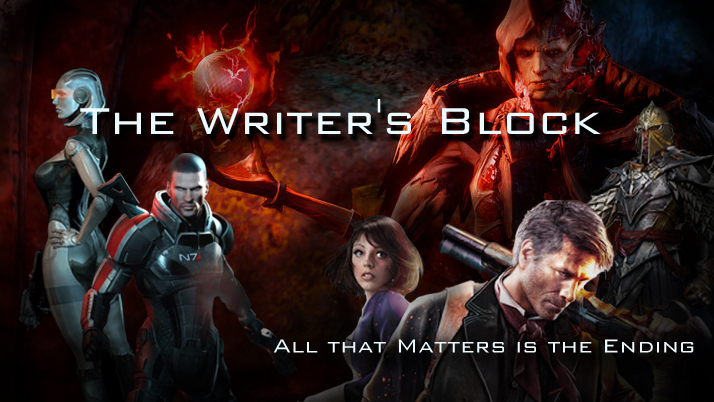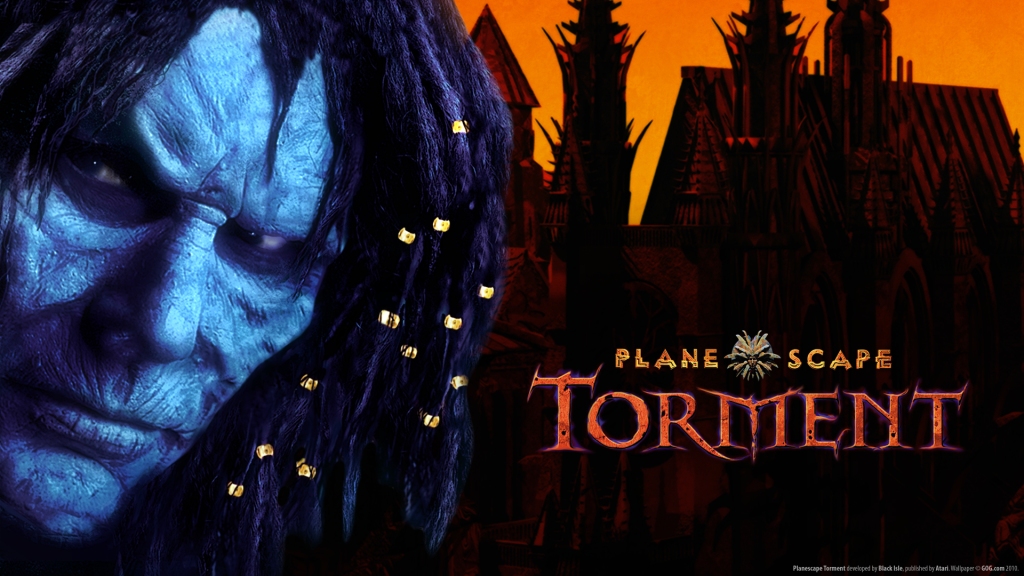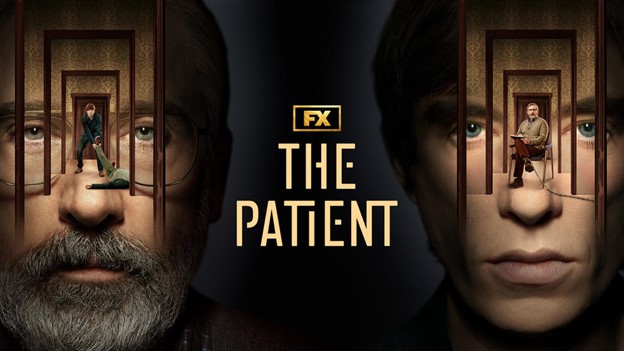There’s only one thing that scares me more than the thought of dying: the thought of living forever. That’s the fear that Planescape Torment explores with such subtle beauty and elegance that my fundamental understanding of what video games can accomplish has been completely rewritten. I knew this game was considered legendarily good before going in, but somehow I just didn’t think a game from 1999 could possibly live up to the hype. Surely it was nostalgia warping people’s perception of the game.
I didn’t play this game when it came out, and I’m actually glad I didn’t. I really doubt that the 11-year-old me would have had the patience for a game with so many words, and he certainly wouldn’t have been able to understand the nuances and themes of the narrative. And I’ve very glad that my Patreon backer Erik Jensen chose this game for me to review, because it was definitely an amazing journey.
My spoiler-free review of the game is this:
Planescape Torment is the most beautifully written game I’ve ever played. It’s a story about the death, the nature of identity, and the power of regret. This game is, without exaggeration, the Citizen Kane of Video Games. It made look at myself and reevaluate my own beliefs and thought processes.
If you’ve never played it, it’s only $10 on Good Old Games and you must absolutely play it. Don’t read my review and spoil it for yourself, because it will absolutely blow your mind.
I really struggled writing this article, because the first draft was like 10,000 words and rambled between various topics. So I’ve decided to just make this a series of articles. The first is just my initial thoughts playing the game. Follow ups will concentrate on specific characters, the setting, narrative structure and anything else I couldn’t fit in here. Seriously, I could write an entire book about everything going on in this game.
Planescape Torment:
“What can Change the Nature of a Man?”
I think one of my greatest fears when I got the game was that it was going to be a constant parade of misery and death. After all, it’s a game about death, how could it not be a never ending march of misery?
And yet the first thing I did upon waking up on that slab in the mortuary was laugh. Out loud. A full bellied, grinning laugh.
Having Morte be there when you wake up was a stroke of absolute genius on the part of Black Isle’s writers. You wake up cold and alone in a mortuary surrounded by walking corpses: you don’t know who you are, you don’t know where you are, and you don’t even know what the world is like outside the small room that is your current universe. Letting the player wander around aimlessly in this environment would have been terrible, because we’d have absolutely no reason to care about our character or figure out who we are. Enter Morte, a floating skull with a sharp tongue…despite not actually having a tongue.
Morte not only introduces you to the world of Planescape, but also sets the tone for the rest of the game. Yes, this is a game about depressing themes like death, betrayal and redemption but that doesn’t mean you won’t get some laughs along the way. That’s important because without that juxtaposition of humor and unspeakable horror, this would have been a real chore to play through.
Morte despite being a head without a body is actually quite useful in combat and we were both easily able to leave the Mortuary. I found myself in the city of Sigil, the city that sits in the center of the Multiverse in which Planescape takes place. It’s called the city of Doors because it links to every other plane in the Multiverse. Sigil is an absolutely amazing setting because it really does make you feel like you’re in a totally alien world.
I mean I guess Planescape would most comfortably in the Fantasy genre, but only in the loosest sense. There are no elves, no dwarfs, there’s really nothing familiar about this world at all. Some of the buildings of Sigil are made from brick and mortar, rotting after centuries of use, but others are carved from bone or bits of fabric hastily stitched together. The roads twist and turn with no discernible pattern, strange creatures called Dabus speak only in strange symbols and constantly rework the streets into new configurations. And on every street corner is a Collector, foul scavengers that linger like vultures around the slums (known as The Hive) where they wait for the sick and dying to finally keel over so they can give them to Dustmen in exchange for a few bits of coin.
So basically it was Detroit.

What I found fascinating was the fact that I felt like the city was dying because of me. As you go through the streets of Sigil you start to realize something: the Nameless One is old. Old enough that stories about The Nameless One have become part of the local mythology. And most of those stories aren’t good.
I walked into a building called the Smoldering Corpse Bar where I found, unsurprisingly, a smoldering corpse. Except it wasn’t a corpse, it was a powerful mage named Ignus who was engulfed in flames. His flesh had been melted from his bones and yet he was alive, but trapped in a coma-like state. After asking around about him I found out that he almost burned the entire city to the ground before an alliance of mages, sorcerers and anyone with even the slightest magical ability managed to contain him, turning him into a living conduit for the element of fire.
I eventually found a way to free him, and found that he was totally insane, but during one of his lucid moments I managed to question him. It turns out I was the man who taught him magic, or rather one of my previous incarnations. This incarnation was a mage of great power, and even greater cruelty, who drove Ignus insane by torturing and tormenting him. All in the name of unlocking Ignus’s power.
Unfortunately Ignus’s story is just one of many and as you uncover more of your past history you’ll come to understand The Nameless One’s torment. The lives you’ve ruined, the destruction you’ve caused, and the chaos wrought by your actions… your very existence is your torment. You’ve become a wound on the multiverse, one that’s begun to fester and spread, possibly threatening to unravel the whole thing.
After scouring the city of Sigil for evidence of your identity you finally come to the person who made you immortal; Ravel the Hag. I came seeking Ravel expecting some conniving schemer, like basically every other “hag” character in the history of storytelling. What I found instead however, was a sad and tormented old woman who had been waiting for so long she barely remembered why.
But after talking for a while she did finally remember: Ravel loved me, had always loved me, and had granted me immortality because she wanted to see me free. I should have been revolted at the advances of a crone with mottled grey skin, long curling green talons and grey lidless eyes. But I found it quite the romantic scene because if you look past the shallow identity of physical appearance, she was really just an enamoured girl who had waited untold millenia for you to arrive.
And this is just the first in a line of deeply humanized villains you encounter throughout the game. Eventually we had talked over everything and before I departed she asked one question:
“What can change the nature of a man?” – Ravel
Not only was I impressed by the question, I was impressed by the number of responses I could give. In fact this was something that had impressed me in through the entire game. There is a ton of dialogue in this game, and it’s all utterly fantastic. I read somewhere there’s something like 800,000 words in this game. It’s really an incredible achievement. I just needed to say that.
So out of the dozen or so answers I had available, I chose the honest option: I had no idea what can change the nature of a man.
Frustratingly Ravel didn’t give me an answer, but I’ve been thinking about that question every day since. Even after learning the answer at the end of the game, it’s still a fascinating philosophical question.

And Ravel, in the tradition of the finest romances, sacrifices herself to try and save you. Though you see her sacrifice in a cut scene, The Nameless One never knows the lengths that Ravel went to in order to repair the damage she caused.
Frankly I was a bit emotionally exhausted by the time I arrived in Curst, a city in the Outlands. I felt like I had just watched a Game of Thrones marathon, that’s how good the writing is. It does what all good writing does, it skips your brain entirely and speaks directly to your heart. But here I was in Curst and there was still a lot of work to be done, there was no time for rest.
I knew that my first incarnation had sought out immortality from Ravel, but Ravel couldn’t restore it. Instead I had to seek out a Deva (an Angel basically) named Trias, locked away somewhere.
To make this already long post shorter, when you free Trias from his imprisonment he tells you that you must seek out your mortality at the Fortress of Regret, whose location is only known to the Pillar of Skulls. Which is, unsurprisingly, a tower of skulls. What was disturbing is that it could speak.

Yes, this is where Morte came from. You see he led your first incarnation to his death by telling you a lie, and his punishment was to forever suffer among that pile of other lying skulls. Turns out your previous incarnation freed him from the pile and took Morte with him.
That’s why he was waiting for you in the Mortuary. What I thought at first was a rather convenient plot device, an easy way to introduce you to the world, turned out to have a plausible reason for its existence. He’d always been there waiting for you, guiding you when you forgot yourself. So why didn’t he reveal himself to you? Because sometimes you woke up crazy.
“One time you woke up and you were convinced I was your skull. You spent days chasing me through the Hive before you were crushed by a horse-drawn cart.”
Well okay, hard to argue with that logic. What the Pillar of Skulls reveals is that it doesn’t know where the Fortress of Regret… but Trias does.
That lying bastard lied to me! THE LIAR!

When I returned to Curst I found that it had been shifted into the prison plane of Carceri. Trias the Betrayer had bargained with the lords of the Lower Planes to deliver Curst to them and open the way for their demon hordes to attack the Upper Planes directly. Why? Because his superiors were secretly arming both sides of the Blood War so that the demons wouldn’t turn their sights on the heavens. Trias believed they should attack now while the demons are divided, and hoped to force the Devas into conflict.
In the end I forgave Trias, not because I condoned what he did, but because after everything my past incarnations had done who was I to pass judgement? And as I urged him to go to his people and beg their forgiveness I was reminded of a line from Dragon Age Origins:
“I am the Penitent Sinner, who shows mercy in the hopes that mercy will be shown to him.” Dragon Age: Origins, Temple of Sacred Ashes.
And in showing mercy to Trias I had hoped that the powers-that-be that ruled the Multiverse would show mercy to the Nameless One.

Which leads us to the finale of the game. Trias reveals that the entrance to the Fortress is back in the Mortuary, a stone’s throw from where you woke up. The Nameless One’s entire life has been a long unending circle that’s never been allowed to close, so I found really thematically fitting. It ends where it all begins.
When you finally arrive at the Fortress of Regret you’re forced to fight your way through the Shadows that have hunted you through the game. It’s here Deionarra, a girl who a previous incarnation got killed specifically so she could serve as a scout, reveals the nature of the Shadows that have been hunting you.
Death cannot be avoided, it can only be deferred. Every death you suffered meant some innocent person somewhere else died in your place. The Shadows are the souls of those people, trapped here in the Fortress of Regrets, unable to rest. Quite frankly I thought this was the most horrifying thing I could possibly imagine. That’s when I met the only other soul more tormented than those that died.
Your soul.
He calls himself the Transcendent one, but he’s simply tormented. Your mortality has experienced the sum of all the rage and hate and fear and pain that had tormented you through the thousands, possibly tens of thousands of years you’ve existed. He brags that this means he has all of the skills you’ve ever accumulated, the spells of the sadistic Mage, the killer instinct (and possibly the insanity) of the Paranoid Incarnation, and the brilliance and callousness of the Practical Incarnation, as well as all those countless others lost to history.
Yet in this boast he also reveals the reason he hates you so much; he’s been suffering all that time. Your mortality never got to forget the pain you’ve caused through your life times, the suffering you’ve wrought and the lives you’ve ruined. Your mortality remembers the face of everyone you’ve killed and he spends his entire existence locked away with the innocent but tormented souls of everyone who took your place when you died. Of course he hates you, how could he not?

I could have fought him and forced him to return, but instead I decided to ask my mortality a question.
“What can change the nature of a man?”
Belief, I told him, belief can change the nature of a man.
Holy shit. Planescape you have blown my mind.
I wish I had had the presence of mind to take screenshots of the whole explanation because it was one of the most thought provoking and quite frankly beautiful things I have ever read. Unfortunately I was sitting in slack jawed amazement that I was reading this in a video game and not Plato’s The Cave.
I’m going to replay the ending so I can grab the quotes, because I’m pretty sure I need to do a whole “All that Matters is the Ending” article just on this ending. Which is probably what I should have done rather than make this long rambling article that took a week to write. That’s how good this game is. So good I forgot how to organize a fucking list article.
You gotta play this game.

So I finally merged with my mortality and did what was necessary: my existence ended and descended to Baator to take part in the Blood War.
The Nameless One had been running in fear of death for countless centuries. I played my Nameless One as someone filled with regret, because that was honestly how I was feeling playing this game and listening to the shit my previous incarnations had done. So I tried to do good as much as I could, but in the end I deserved to go to Baator. The damage I’d done in my previous incarnations, the damage caused by his desire to avoid death.
But I wasn’t disappointed by the ending, it was emotionally satisfying because as the Nameless One picked up a mace and walked into the Blood War to do his penance, behind him was the Rune of Torment. He walked into that maelstrom of unending war having finally left behind the torment of a life without end. Compared to the hell he’d just gone through, the punishment in Baator he’d feared so much must have paled by comparison.
And I think Grace’s words were probably ringing in his ears:
Time is not your enemy. Forever is.









Leave a comment